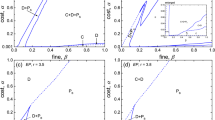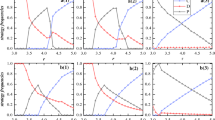Abstract
To explore the incentive mechanisms of cooperation in social dilemmas. Motivated by preference for reputation in indirect reciprocity, we propose a reputational preference-based payoff punishment mechanism, under which an individual is punished if his reputation is lower than the average one of direct neighbors and his current game strategy is defection. The cost of punishment is shared by the immediate neighbors. Simulation results show that in spatial prisoner’s dilemma game and snowdrift game, the punishment mechanism reduces the fitness of both cooperators and defectors in the micro-perspective, whereas it significantly promotes the evolution of cooperation from the macro view. Furthermore, it is easier for cooperation to emerge and sustain in snowdrift game, and compared to prisoner’s dilemma game, within the most range of model parameters, the system is in the coexistence state of cooperators and defectors.
Graphic abstract






Similar content being viewed by others
Data Availability Statement
This manuscript has no associated data or the data will not be deposited. [Authors’ comment: The data used to support the findings of this study are available from the corresponding author upon request.]
References
E. Pennisi, How did cooperative behavior evolve? Science 309, 93 (2005)
S.J. Gould, Darwinism and the expansion of evolutionary theory. Science 216, 380–387 (1982)
C. Hilbe, T. Röhl, M. Milinski, Extortion subdues human players but is finally punished in the prisoner’s dilemma. Nat. Commun 5, 1–6 (2014)
M.A. Nowak, A. Sasaki, C. Taylor et al., Emergence of cooperation and evolutionary stability in finite populations. Nature 428, 646–650 (2004)
J.E. Bone, B. Wallace, R. Bshary et al., Power asymmetries and punishment in a prisoner’s dilemma with variable cooperative investment. PloS one 11, e0155773 (2016)
X. Deng, Q. Zhang, Y. Deng et al., A novel framework of classical and quantum prisoner’s dilemma games on coupled networks. Sci. Rep. 6, 1–11 (2016)
J.M. Smith, In Evolution and the Theory of Games (Cambridge University Press, Cambridge, 1982)
J.W. Weibull, In Evolutionary Game Theory (MIT press, Cambridge, 1997)
H. Gintis, In Game Theory Evolving: A Problem-Centered Introduction to Modeling Strategic Behavior (Princeton University Press, Princeton, 2000)
M.W. Macy, A. Flache, Learning dynamics in social dilemmas. Proc. Natl. Acad. Sci. USA 99, 7229–7236 (2002)
F.C. Santos, J.M. Pacheco, T. Lenaerts, Evolutionary dynamics of social dilemmas in structured heterogeneous populations. Proc. Natl. Acad. Sci. U.S.A. 103, 3490–3494 (2006)
A. Szolnoki, M. Perc, Resolving social dilemmas on evolving random networks. EPL 86, 30007 (2009)
M.G. Zimmermann, V.M. Eguluz, Cooperation, social networks, and the emergence of leadership in a prisoner’s dilemma with adaptive local interactions. Phys. Rev. E 72, 056118 (2005)
A. Szolnoki, G. Szab, Cooperation enhanced by inhomogeneous activity of teaching for evolutionary Prisoner’s Dilemma games. EPL 77, 30004 (2007)
M. Perc, A. Szolnoki, Social diversity and promotion of cooperation in the spatial prisoner’s dilemma game. Phys. Rev. E 77, 011904 (2008)
C. Hauert, M. Doebeli, Spatial structure often inhibits the evolution of cooperation in the snowdrift game. Nature 428, 643–646 (2004)
W. Du, X. Cao, M. Hu et al., Asymmetric cost in snowdrift game on scale-free networks. EPL 87, 60004 (2009)
M.O. Souza, J.M. Pacheco, F.C. Santos, Evolution of cooperation under N-person snowdrift games. J. Theor. Biol. 260, 581–588 (2011)
M. Sefton, R. Shupp, J.M. Walker, The effect of rewards and sanctions in provision of public goods. Econ Inq 45, 671–690 (2007)
D.G. Rand, A. Dreber, T. Ellingsen et al., Positive interactions promote public cooperation. Science 325, 1272–1275 (2009)
A. Szolnoki, M. Perc, Reward and cooperation in the spatial public goods game. EPL 92, 38003 (2010)
M.A. Nowak, Five rules for the evolution of cooperation. Science 314, 1560–1563 (2006)
M. Milinski, D. Semmann, H.J. Krambeck, Reputation helps solve the ‘tragedy of the commons’. Nature 415, 424–426 (2002)
C. Wedekind, V.A. Braithwaite, The long-term benefits of human generosity in indirect reciprocity. Curr. Biol. 12, 1012–1015 (2002)
P. Barclay, Trustworthiness and competitive altruism can also solve the ‘tragedy of the commons’. Evol. Hum. Behav. 25, 209–220 (2004)
F. Fu, C. Hauert, M.A. Nowak et al., Reputation-based partner choice promotes cooperation in social networks. Phys. Rev. E 78, 026117 (2008)
M.A. Nowak, M.M. Robert, Evolutionary games and spatial chaos. Nature 359, 826–829 (1992)
E. Lieberman, C. Hauert, M.A. Nowak, Evolutionary dynamics on graphs. Nature 433, 312–316 (2005)
P. Holme, B.J. Kim, Growing scale-free networks with tunable clustering. Phys. Rev. E 65, 026107 (2002)
F.C. Santos, J.M. Pacheco, Scale-free networks provide a unifying framework for the emergence of cooperation. Phys. Rev. Lett. 95, 098104 (2005)
A. Szolnoki, M. Perc, Z. Danku, Towards effective payoffs in the prisoner’s dilemma game on scale-free networks. Physica A 387, 2075–2082 (2008)
N. Masuda, K. Aihara, Spatial prisoner’s dilemma optimally played in small-world networks. Phys. Lett. A 313, 55–61 (2003)
G. Szab, J. Vukov, Cooperation for volunteering and partially random partnerships. Phys. Rev. E 69, 036107 (2004)
X. Chen, L. Wang, Promotion of cooperation induced by appropriate payoff aspirations in a small-world networked game. Phys. Rev. E 77, 017103 (2008)
R. Axelrod, An evolutionary approach to norms. Am. Polit Sci. Rev. 80, 1095–1111 (1986)
E. Ostrom, J. Walker, R. Gardner, Covenants with and without a sword: self-governance is possible. Am. Polit Sci. Rev. 86, 404–417 (1992)
E. Fehr, S. Gächter, Cooperation and punishment in public goods experiments. Am. Econ. Rev. 90, 980–994 (2000)
E. Fehr, S. Gächter, Altruistic punishment in humans. Nature 415, 137–140 (2002)
D. Masclet, C. Noussair, S. Tucker et al., Monetary and nonmonetary punishment in the voluntary contributions mechanism. Am. Econ. Rev. 93, 366–380 (2003)
J. Andreoni, W. Harbaugh, L. Vesterlund, The carrot or the stick: rewards, punishments, and cooperation. Am. Econ. Rev. 93, 893–902 (2003)
D. Helbing, A. Szolnoki, M. Perc et al., Punish, but not too hard: how costly punishment spreads in the spatial public goods game. New J. Phys. 12, 083005 (2010)
Z. Wang, C. Xia, S. Meloni et al., Impact of social punishment on cooperative behavior in complex networks. Sci. Rep. 3, 3055 (2013)
A. Szolnoki, G. Szab, M. Perc, Phase diagrams for the spatial public goods game with pool punishment. Phys. Rev. E 83, 036101 (2011)
A. Szolnoki, G. Szab, L. Czak, Competition of individual and institutional punishments in spatial public goods games. Phys. Rev. E 046106(2011)
A. Szolnoki, M. Perc, Effectiveness of conditional punishment for the evolution of public cooperation. J. Theor. Biol. 325, 34–41 (2013)
X. Chen, A. Szolnoki, M. Perc, Probabilistic sharing solves the problem of costly punishment. New J. Phys. 16, 083016 (2014)
M. Perc, A. Szolnoki, A double-edged sword: Benefits and pitfalls of heterogeneous punishment in evolutionary inspection games. Sci. Rep. 5, 1–11 (2015)
X. Chen, A. Szolnoki, Punishment and inspection for governing the commons in a feedback-evolving game. PLoS Comput. Biol. 14, e1006347 (2018)
A. Szolnoki, M. Perc, Second-order free-riding on antisocial punishment restores the effectiveness of prosocial punishment. Phys. Rev. X 7, 041027 (2017)
G. Szab, C. Tke, Evolutionary prisoner’s dilemma game on a square lattice. Phys. Rev. E 58, 69 (1998)
M.A. Nowak, R.M. May, The spatial dilemmas of evolution. Int. J. Bifurcat. Chaos 3, 35–78 (1993)
Acknowledgements
This work was supported by (i) Research on Complex Network Hogher-order Structure-based Key Community and Node Discovery, as well as Power Network Planning and Security; (ii) National Natural Science Foundation of China (Grant No. 62062049); (iii) Project supported by the Natural Science Foundation of Gansu Province, China (Grant No. 20JR5RA390).
Author information
Authors and Affiliations
Contributions
Conceptualization, XW; methodology, PX and S-TD; software, XW and G-HY; validation, S-TD and H-YP; writing-original draft, XW; writing-review and editing, H-YP and PX. All authors have read and agreed to the published version of the manuscript.
Corresponding author
Rights and permissions
About this article
Cite this article
Wei, X., Xu, P., Du, S. et al. Reputational preference-based payoff punishment promotes cooperation in spatial social dilemmas. Eur. Phys. J. B 94, 210 (2021). https://doi.org/10.1140/epjb/s10051-021-00212-w
Received:
Accepted:
Published:
DOI: https://doi.org/10.1140/epjb/s10051-021-00212-w




